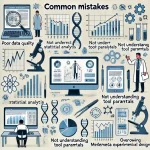
Are Computational Biologists Reinventing the Wheel for Big Data Analysis in Biology?
December 28, 2024Genomics is undoubtedly special, and its importance continues to grow in both basic and applied sciences. As a bioinformatician, I can confidently say that genomics provides us with a foundational understanding of biology at a molecular level, enabling the exploration of genetic factors underlying health, disease, and biodiversity. While it’s true that computational biologists face challenges in managing and analyzing the ever-expanding volumes of big data generated in genomics, it’s not so much about “reinventing the wheel” as it is about the ongoing evolution of computational methods to keep pace with the complexity and scale of modern genomic data.
Big Data Challenges in Genomics
The sheer scale of genomic data is one of the most significant challenges in the field. Whole-genome sequencing, RNA-Seq, epigenomic profiling, and single-cell sequencing all generate massive amounts of data, requiring advanced computational tools for storage, analysis, and interpretation. The diversity of data types, ranging from DNA sequences to gene expression profiles, adds further complexity.
However, this challenge is driving innovation in bioinformatics. New algorithms and tools are being developed for better data compression, faster alignment, more accurate variant calling, and efficient multi-omics integration. Technologies like cloud computing and artificial intelligence (AI) are being harnessed to accelerate data processing, enabling faster discoveries and more personalized healthcare solutions.
Computational Biology and Genomics: Not Reinventing the Wheel, But Evolving It
Rather than reinventing the wheel, computational biologists are improving existing frameworks to address the complexities of big data. For instance, in genomics, machine learning and deep learning have become indispensable tools for identifying patterns in genetic data that are not easily discernible through traditional methods. Techniques like unsupervised learning and neural networks are being applied to transcriptomics and epigenomics to gain insights into gene regulation and cellular mechanisms. The integration of multi-omics data, such as combining genomics, transcriptomics, proteomics, and metabolomics, is helping to provide a more comprehensive understanding of biological processes.
Recent trends like precision medicine and pharmacogenomics are benefitting immensely from advancements in computational biology. By leveraging genomic data, AI can predict individual responses to drugs or therapies, ultimately leading to personalized treatment plans and better patient outcomes. Furthermore, the discovery of disease-associated genetic variants is being accelerated through large-scale genomic studies, particularly in areas like cancer genomics and rare genetic diseases.
Recent Advancements in Genomics and Computational Biology
- Single-cell genomics: The advent of single-cell sequencing technologies has revolutionized genomics by enabling the study of gene expression at the resolution of individual cells. This allows for the exploration of cellular heterogeneity and tissue complexity, which is critical for understanding disease mechanisms and developmental biology.
- Long-read sequencing technologies: Long-read sequencing technologies, such as PacBio and Oxford Nanopore, have overcome the limitations of short-read sequencing, providing more accurate and comprehensive views of genomes, including complex structural variants, repetitive regions, and full-length transcripts.
- AI and machine learning in drug discovery: Genomic data is being increasingly integrated with other forms of biological data (e.g., proteomics, metabolomics) using AI-powered approaches to discover novel drug candidates and predict how they interact with the body at a molecular level.
- Cloud computing and infrastructure for genomics: With data growing exponentially, cloud computing offers scalable solutions for storing and processing genomic data. Platforms like Google Genomics and Amazon Web Services (AWS) are providing accessible tools and resources for researchers, democratizing access to genomic analysis and computation.
- Ethical considerations and data privacy: As genomic data becomes more integrated into healthcare systems, ethical considerations surrounding privacy, consent, and data sharing are becoming increasingly important. Advances in blockchain and federated learning are being explored to enable secure sharing of genomic data while maintaining patient privacy.
In Summary:
Genomics is a special field because it serves as the key to unlocking the molecular underpinnings of life, disease, and evolution. While the volume and complexity of data present challenges, the field is far from stagnant. Bioinformaticians are not “reinventing the wheel” but are continuously evolving computational methods to meet new challenges and push the boundaries of knowledge. With the ongoing integration of AI, cloud computing, and advanced sequencing technologies, genomics is poised for even more exciting breakthroughs in personalized medicine, drug discovery, and our understanding of human biology.
As someone deeply involved in both health informatics and bioinformatics, I’ve witnessed firsthand the transformative potential of computational biology in genomics, and I’m excited about the ongoing trends that promise to shape the future of this field. The intersection of genomics and big data will continue to redefine what we understand about life, disease, and the potential for intervention.

















